Solar energy in continuous (dry-running) mode
Lubricant-free polymer plain bearings for photovoltaic tracking systems
The photovoltaic market is transitioning. Declining feed-in rates for solar power have impacted the general investment willingness. A young company in the industry is nevertheless able to prevail. It is relying on rugged tracking systems that make efficient use of solar energy for the full day. Polymer plain bearings are used so that these can work reliably in wind and weather. They provide the necessary functional reliability.
"The basic idea of our company was to cost effectively and efficiently implement solar tracking with ingenious technology", explains Thomas Vogel, Managing Director and company spokesperson for TecnoSun Solar Systems AG in Neumarkt/Oberpfalz. The company was founded in April 2010, and employs approximately 12 employees as a manufacturer of photovoltaic (PV) systems. The company headquarters are in an ideal location: the location conditions in a city promoting renewable energies provides fertile ground for the young company. Since decentralising electrical power markets will continue to be an important topic into the future, it is primarily communities and municipalities, but also private investors who rely on renewable energies.
Whereas the basic system originally consisted of a two-axis guide, it is now complemented by a single axis guide. This is supplemented by an aerodynamic system for flat roofs. This involves a fixed frame solution that is installed on flat roofs without penetrating the roof skin. "And at Intersolar, we will be presenting a system for noise protection walls that has already generated significant premarket interest", Thomas Vogel explains. "It will be produced in series no later than midyear “
The demand is currently clearly for vertical single axis tracking systems, which are operated more cost-effectively. However two axis tracking systems become economical as one travels further into the southern parts of Europe, where the sun's irradiation is dramatically higher. Solar panels only attain their maximum performance when the sun's rays impact the panels at a 90° angle. Tracking systems for PV plants are systems that work independently of the basic surface orientation. They track the sun throughout the day and therefore establish an ideal angle between the sun and the solar panel, optimising panel yields. Records show that the yield gains by using a tracking system can be as high as 40 %. This dramatically improves performance and achieves uniform yield throughout the entire day. "In the past, tracking systems were frequently associated with negative commentary", Thomas Vogel explains. "They are conventionally regarded as too expensive and unsightly due to their size, since they are typically several metres in height We took a different approach and wanted to keep the installation height low, which also dramatically reduced costs in comparison to other systems.
Accordingly, the benefits of this supplier's tracking systems are quickly summarised as follows: among others, these include the low installation height of roughly 1.5 m and the associated efficient use of materials. The PV plants are therefore integrated well into the landscape and provide low surface exposure to the wind. This is complemented by the drive concept. Up to 120 trackers are operated with a single motor. This corresponds to a module surface of roughly 400 m2, dramatically reducing system cost.
The force is transferred with a high-strength wire cable that is routed around each of the individual tracking racks. The motor receives positioning signals from an electronic control. These are transferred to a rotating lead screw that in turn moves the wire rope, which then deflects the individual racks. Using this approach, the position of the tracking system is constantly adjusted to the sun's track.
Typically a tracking system is anchored into the ground with concrete elements, which must be elaborately removed at some point. "Our anchoring system consists of ground screws. The relatively straightforward mechanical system, consisting of a metal structure, is installed on the ground screws", explains Thomas Vogel. The friction in the system is negligible This is due to lubricant free polymer plain bearings made by igus® GmbH, Cologne. There is almost no application where the lubricant-free bearing technology cannot demonstrate its versatility.
Three lubricant-free bearings each are employed between the drum, the traction ring, and the base plate. "For this location we were looking for a premium and high-performance solution that not only needed to be completely dry-running, but is also durable in the face of environmental conditions", Thomas Vogel recalls. Plant service lives of several decades are part of the requirements profile. And in a worst-case scenario, the plain bearings need to be quickly and conveniently replaceable as part of maintenance and service schedules.
The iglidur® P allrounder material meets this requirements profile. Due to their thermal stability and low moisture absorption, these plain bearings are among the most dimensionally stable in varying environmental conditions. Recommended for rotary movements with medium to high loads. It is also cost-effective, which is favourable in terms of financial considerations.
"Before we started developing the plant, we conducted a series of extensive field tests with a wide range of bearings to obtain reliable data about load behaviours. Several providers presented their products", Thomas Vogel explains. "The test results repeatedly and clearly favoured lubricant-free polymer plain bearings from a technical point of view. This is compounded by the good price/performance ratio and the comprehensive support. Our assigned field service contact, Bernhard Hofstetter, is constantly in contact with us, and informs us about new developments or updates, therefore always keeping us abreast of the latest technical developments. “
The requirements profile for plain bearings is extremely demanding. They must be resistant to weather for decades, be able to deal with dirt and moisture, and must be easy to assemble. The weight from snow loads also plays a role. These place significant loads on sub-sections, since relatively powerful rotational motions act on the mechanical base structure. In addition, tensile stresses that can amount to several 100 kg occur in the corner locations where the rope pulls.
Before the decision was made as to which material was best suited for this requirements profile, the polymer supplier also performed several load calculations and recommended the iglidur® P material based on a process of elimination.
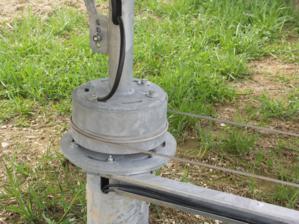
Three polymer plain bearings are used by the traction ring.
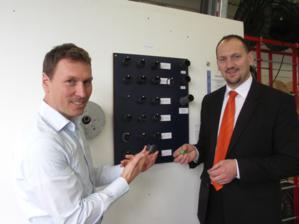
Thomas Vogel from TecnoSun Solar Systems (left) and Bernhard Hofstetter from igus® show how the individual bearings performed during the extensive preliminary tests. The green plain bearings made from iglidur® N54 (made up to 54% from renewable raw materials) are used in the pivot arm of the two-axis systems.
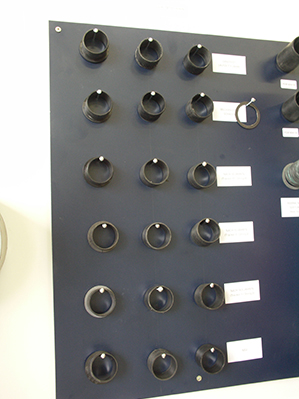
Test series using the individual bearings, which were extensively tested in advance primarily with respect to loads. Polymer plain bearings made from iglidur® P materials proved to be unbeatable.
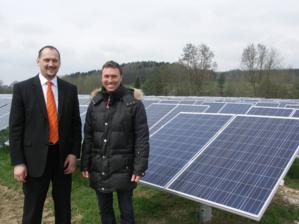
Bernhard Hofstetter (left), Thomas Vogel at the solar park in Postbauer-Heng. About 13,000 polymer plain bearings are installed in this PV plant alone.
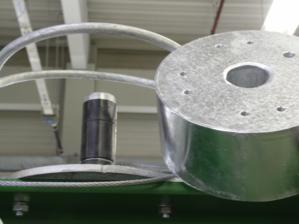
Photovoltaic plants can also be installed on noise protection walls. Three dry running polymer plain bearings ensure the necessary availability.
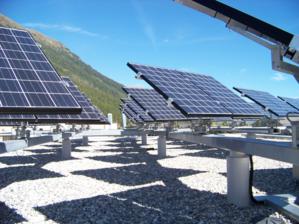
Vertical tracking systems maximise solar energy yields throughout the day.
In contrast to the mechanical engineering applications, the not pressed in plain bearings rotate around fully galvanised surfaces. Due to the necessary installation tolerances, there remains a risk that the bearing can seize on the outside as well as inside diameter. Here as well, the preliminary tests demonstrated that polymer plain bearings do not have a problem with this. The bearings operate in the tracking systems from the first day forward without this resulting in unnecessary downtime.
"Consideration was also given to our standard iglidur® G material, which has performed well in untold numbers of applications worldwide", explains the assigned technical sales consultant from the igus® North-Eastern Bavaria office, Bernhard Hofstetter. "We started out by conducting initial sample trials. But we ultimately decided in favour of the iglidur® P material due to the low moisture absorption and thermal expansion. “
In addition to the rotational points, the two-axis systems also use another material from the extensive polymer plain bearing product range. Plain bearings made from iglidur® N54 materials are used on the control lever. Renewable raw materials make up as much as 54% of the bio-polymer, which is universally usable, and fulfills all requirements with respect to a lack of lubricants and maintenance.
In addition, the iglidur® Q2 material is demonstrating its resistance to wear in a two-axis system located in the Swiss mountains at an altitude of 1,800 m. Shape stable at high loads, it is predestined for heavy-duty pivot applications under extreme conditions. "At this altitude, temperatures have extreme variations throughout the year – which is compounded by snow during the winter season", Thomas Vogel elaborates. "We use wear-resistant bearings to make our tracking system even more rugged and more maintenance-friendly. Nature exerts extreme loads under these difficult climatic conditions. And our initial experience has been very good. Polymer bearings also meet our basic requirements for cost-effective solutionswithout compromising quality!"
A solar park has emerged on approximately 5.5 ha of land in the Postbauer-Heng municipality near Neumarkt. More than 9,000 solar panels were erected at the 'Kuhtrift' grounds close to the rail line in the record time of roughly 6 months, including all permit applications. The plant is rated for a maximum hourly output of roughly 2.1 MWh. Thomas Vogel elaborates: "Our assumption is that the plant will supply roughly 2,400,000 kilowatt hours of electrical power per year. For comparison: a multi-family dwelling consumes about 4,000 kWh per year.
Economy and ecology become reality in PV plants. Low-cost and lubricant-free polymer plain bearings ensure high long-term availability. "The cost-benefit effect simply works", Thomas Vogel concludes. "This is of vital importance for a company that is still getting established. And if policymakers don't throw a wrench in the works, we should have smooth sailing ahead. “
More than 100,000 products available! Delivery and consultation Mon-Fri from 7am-8pm and Sat from 8am-12pm!